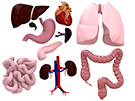
One day, Dave, young people may be going to college to learn how to be an organ farmer.
What? A farmer in Oregon?
No, not the state -the body part!
Right! Organ farmers! These scientists are doing remarkable work. They harvest cells from a patient and seed the tissue scaffolding for growing body parts. I can't even grow a tomato in my yard much less an organ! They've already created bladders and ears. Next on the list are hearts, eyes, kidneys and other organs.
Recently, surgeons implanted a bioengineered trachea into a 2 1/2 year old child. Doctors harvested stem cells from her bone marrow. In the lab, the cells were allowed to adhere to a plastic fiber model of a toddler sized trachea. Then it's placed in an incubator called a tissue bioreactor.
In the course of two weeks, the stem cells began colonizing the plastic and as they grew, signaled neighboring cells to work together to produce all the cell types needed for a functioning trachea. So far the surgery is a success.
Since the cells are her own, there's no issue with rejection, and without a perpetual tube down her throat the toddler was able to smile for the first time. One future issue is she'll eventually outgrow the implanted trachea. Since the current one uses a plastic scaffolding, it won't grow with her and she'll need a larger one.
Improvements on this technology may include donor scaffolding from cadavers or a biodegradable plastic that would allow the tissue to replace it. What's next are clinical trials and FDA approval so that many others can be helped.
As the practice becomes more common, suggestions by scientists and doctors can improve these bioengineered tissues and body parts. Looks like a promising future for organ farmers!
More Information
Groundbreaking Surgery for Girl Born Without Windpipe
NY Times article about this Illinois girl and her family and the ground breaking surgery that produced a bioengineered trachea.
First Fully Synthetic Organ Transplant Saves Cancer Patient
"Artificial trachea built from scratch shows the promise of regenerative medicine."
The science of regrowing human organs
"We are still in the early stages of organ bioengineering, just breaking new ground and exploring options. Routine use of these techniques, if they prove successful in humans, may be a decade or more in the future. But the ideas and techniques are exciting and challenging. And the next few years of work in this field should be very interesting."